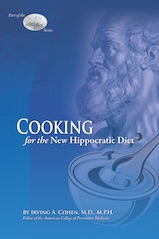Brought to you by The Foundation for Prevention and Dr. Irving A. Cohen
KEY TOPICS AND QUICK LINKS:

** Diabetes is a serious disease. This website can not and is not intended to provide individual medical advice. If you are currently using any form of diabetic medication, significant dietary change may necessitate modification or discontinuation of your medication schedule. Consult a qualified medical practitioner for individual direction and medical advice. **
KEY TOPICS AND QUICK LINKS:
What is the Diabetic Spectrum Disorder?

Diabetic Spectrum Disorder is our term describing the all-encompassing nature of Type 2 Diabetes.
Our understanding of diabetes today is more comprehensive then that that of the ancient healers, yet in some ways, we define it no differently. We have been taught that the 20th century brought about the discovery of insulin and the cure for diabetes. Although a major step in understanding diabetes mellitus, it was only the beginning of our understanding this complex disease. The majority of the world's diabetics have what we now call Type 2 Diabetes Mellitus. The ancients recognized the illness of diabetes only when the sick person produced large amounts of urine, urine that attracted flies because it contained sugar! The 19th century gave us the knowledge that this occurred because the amount of sugar in the blood was much higher than normal. The 20th century discovery of insulin, showed that insulin, produced in the pancreas, was the hormone that controlled that sugar level.
Today, we recognize this as part of a complex spectrum. Many type 2 diabetics have the ability to reverse the course of their disease and put their diabetes into remission. Almost two centuries of improvements in agriculture, food preservation and food transportation have radically changed human-kind's relationship to food. Today's massive epidemic of Type 2 Diabetes is the result of some of these changes in our food supply, changes that accelerated in the past four decades.
The ability of good dietary changes to reverse diabetes has been understood for millennia, yet is largely ignored today. Those diagnosed with diabetes are often given no option except the use of pharmaceuticals. Instead, dietary recommendations given today to sufferers of diabetes are designed to work in conjunction with pharmaceuticals, instead of reversing the course of diabetes on their own.
Moreover, those who have not yet been diagnosed with diabetes need to understand that Type 2 diabetes is a progressive disease. In its early and middle stages it usually goes unrecognized. This seems irrational, for in the 21st century we have the tools to easily identify and change the course of this disease. Recently, government health authorities have been talking about this. You may have heard the terms pre-diabetes or the metabolic syndrome. This is a step in right direction, but does not acknowledge the seriousness of this. Most people, physicians included, hear those terms and think they simply describe a precursor to developing diabetes. Why? Because we are still still using the the ancient definition of diabetes as high blood sugar, which downplays that this precursor is dangerous in itself.
How does this happen? In diabetes' early stages, your body may be successful in fighting off high blood sugar, but it is being damaged as it does so. We are taught to think about diabetes as a disease which there is not enough insulin. In these early stages, just the opposite is true! Your body produces an excessive amount of insulin because of your diet! It is successfully keeping your sugar controlled while straining your pancreas to do so. It is producing vast amounts of insulin. This results in cellular resistance to this very vital insulin, and creates a vicious cycle. The more excess insulin your body produces, the more insulin resistance it creates. This comes at a very high price, since this cycle is also creating inflammation that can lead to plaque formation, liver disease and hormonal disruption.
Have you known of someone in seemingly good health, who had a checkup every year, who was told their blood tests were normal, yet suddenly develops heart disease, kidney disease, liver disease, neuropathy, ovarian cysts, stroke or some other ailment out of the blue. What about someone who was told they were diabetic only after their heart attack? If you know of someone this happened to, or if you just wish to learn more go to www.diabetesrecovery.com to see if you or some close to you could be a hidden diabetic.
Your purchase of books or courses through this website will help fund the Foundation for Prevention in its work.
Thank You.

Thank You.



